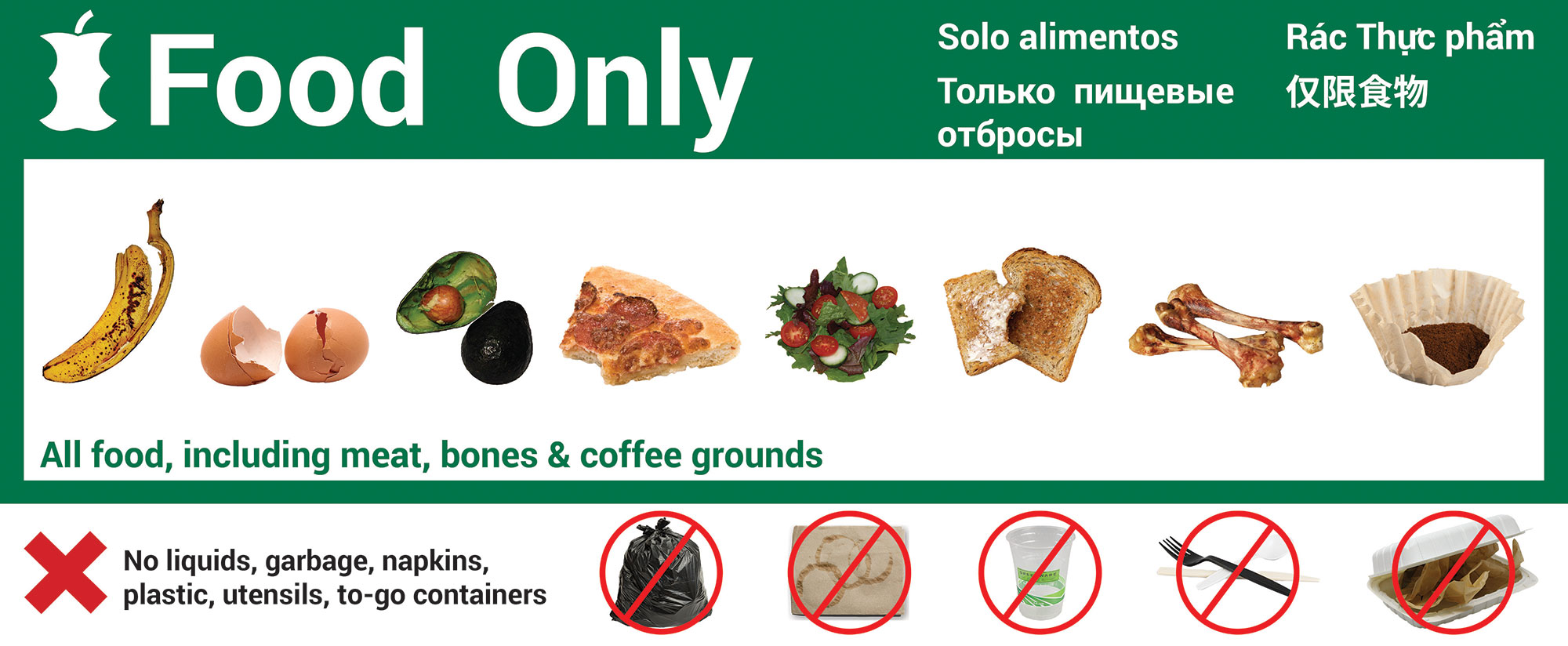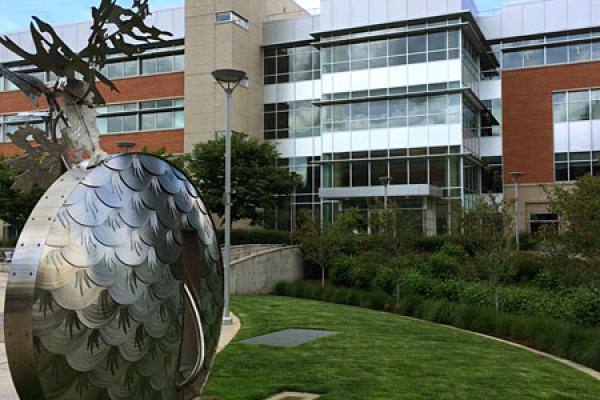Businesses generate over half the waste in our region. Businesses are responsible for meeting local regulations to separate certain materials for recycling and to have identifiable internal bins and educational signs for employees. Food businesses must also minimize plastic waste and in some areas, separate food scraps to be composted. To help you comply with these requirements, we provide free tools and support.
Recycling
Effective 2009, all workplaces — including businesses, schools, public agencies and non-profit organizations—are required to recycle the materials listed below, have internal containers designated for recycling, post signs showing employees what can be recycled, and at least once a year educate employees on the guidelines of what is allowed in the program.
Separate these materials for recycling:
- Paper and cardboard
- Plastic bottles, jugs, round tubs and buckets
- Metal
- Glass – bottles and jars (collected separately)
Everyone in Clackamas, Multnomah and Washington Counties can include the same items in their recycling at work and home. Businesses with dumpster or cart-based garbage service have access to mixed recycling service as part of the fee.
For more information about the requirements, view Clackamas County Code (see Chapter 10.03.145 Business Recycling Requirement).
Food Waste
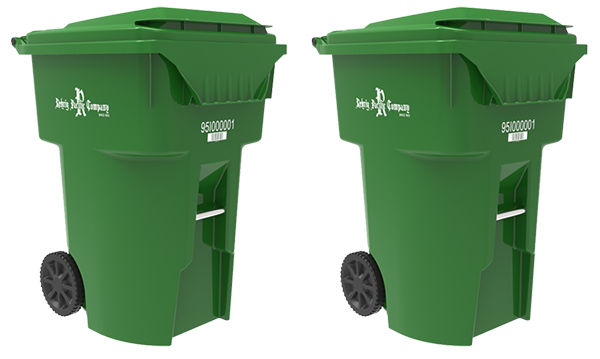 Food businesses within the Metro District that dispose of at least 60 gallons of food waste per week must separate that material for collection. This requirement covers all businesses that sell, cook, serve, process, and/or assemble food: restaurants, grocers, manufacturers, hospitality, etc. The covered material includes all waste from fruits, vegetables, meats, breads and grains, dairy, fish and shellfish, nuts, seeds, coffee grounds, and other foods.
Food businesses within the Metro District that dispose of at least 60 gallons of food waste per week must separate that material for collection. This requirement covers all businesses that sell, cook, serve, process, and/or assemble food: restaurants, grocers, manufacturers, hospitality, etc. The covered material includes all waste from fruits, vegetables, meats, breads and grains, dairy, fish and shellfish, nuts, seeds, coffee grounds, and other foods.
The regulation only applies to wasted food handled by employees. Businesses are not required to collect food scraps that have been disposed of directly by customers in front-of-house operations.
Property owners and managers must allow for the collection of food waste by these businesses or help secure the service for lessees that are covered under the requirement.
For more information about the requirements, view Clackamas County Code (see Chapter 10.03.147 Food Waste Requirement) or visit How to Reduce Food Waste.
Statewide Policies
Single-use Plastic Bag Ban
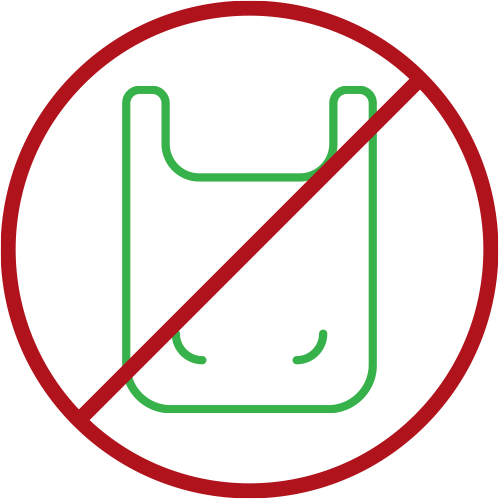 Retail stores and restaurants are prohibited from providing single-use plastic checkout bags to customers. Businesses may still provide reusable or recycled-content paper bags and must charge a fee for providing the bag.
Retail stores and restaurants are prohibited from providing single-use plastic checkout bags to customers. Businesses may still provide reusable or recycled-content paper bags and must charge a fee for providing the bag.
Paper bags must be made with at least 40% post-consumer recycled fiber. Reusable bags include fabric bags or thick plastic (4 mil or more). The per-bag fee for paper or reusable plastic is 5 cents in Clackamas County, except in Lake Oswego, where it is 10 cents.
Learn more about the statewide single-use bag ban.
Print and hang educational posters to inform and educate customers.
Single-use Plastic Straws in Food Service Facilities
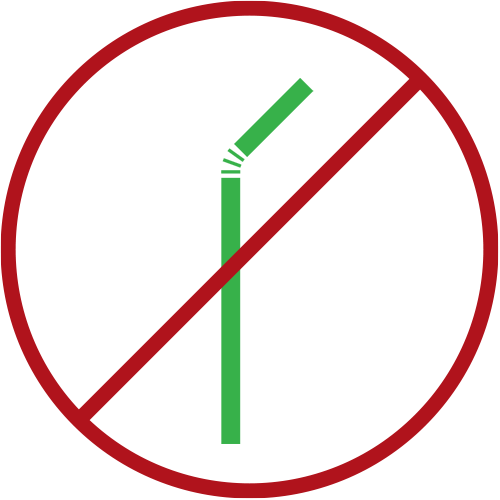 Effective January 2020, food service establishments (restaurants, bats, hospitality, etc.) are prohibited from automatically providing plastic, single-use straws. They are to be available by request only. Automatically providing single-use plastic straws to customers is prohibited. Dine-in customers must request plastic straws. Drive-thru and takeout customer can be asked if they need one. Paper or bamboo straws can still be provided automatically.
Effective January 2020, food service establishments (restaurants, bats, hospitality, etc.) are prohibited from automatically providing plastic, single-use straws. They are to be available by request only. Automatically providing single-use plastic straws to customers is prohibited. Dine-in customers must request plastic straws. Drive-thru and takeout customer can be asked if they need one. Paper or bamboo straws can still be provided automatically.
Polystyrene Foam and PFAS Container Ban
Oregon is foam-free starting 2025!
In 2023, Oregon adopted SB 543 that bans the use and sale of polystyrene foam containers and containers with intentionally added PFAS for prepared foods. It also bans the sale of foam packing peanuts and single-use foam coolers.
Please refer directly to the bill or the Department of Environmental Quality for more details and definitions.
Free Assistance
We’re here to help you meet and maintain compliance. Every year we provide hundreds of workplaces with free tools and support to make recycling easier for their employees. We offer the following at no charge:
- Virtual consultations and customized assistance
- Virtual presentations and staff trainings
- Customized posters and educational flyers
- Curbside delivery of resources
- Help navigating waste options and service with your franchised waste hauler
Beyond Recycling to Sustainability
We also help workplaces go beyond basic recycling to reduce waste, operate more efficiently and receive recognition for their sustainability efforts. Contact us today!
 Translate
Translate







